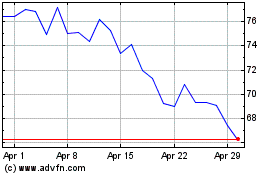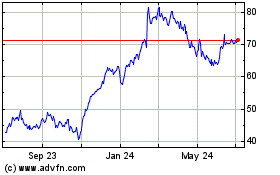By Eliot Brown
This article is being republished as part of our daily
reproduction of WSJ.com articles that also appeared in the U.S.
print edition of The Wall Street Journal (January 25, 2020).
Mattress startup Casper Sleep Inc. typifies the kind of startup
that Silicon Valley investors fawned over through the 2010s,
defined by big vision and rapid growth at the expense of
profits.
Now, it is seeking to go public at the very time that such a
model appears to have fallen out of favor, in a test of what is to
come for dozens of similar loss-heavy startups that need to raise
money as private fundraising becomes more difficult.
The mood in Silicon Valley has changed dramatically in the past
year, as Wall Street investors have proven far less enamored with
many high-profile, high-loss startups than venture capitalists
expected. Uber Technologies Inc.'s stock is down 16% since its
listing last year, and Lyft Inc.'s is down 32%, while the Nasdaq
composite index is up over 18%. Their experience, along with the
failed effort to go public by WeWork parent We Co., have left
startup financiers fearing the same fate for their own investments,
and sparked a scramble across Silicon Valley to stanch the flow of
red ink.
New York-based Casper, which this month filed paperwork for a
planned initial public offering, is considerably smaller than the
ridehailing companies and WeWork. But it shares traits, most
notably a tendency toward burning through capital and a business
model vulnerable to intense competition.
For the first nine months of last year, Casper reported a net
loss of $67 million on $312 million of revenue, with $54 million of
cash. It has raised more than $300 million from investors, with a
valuation on the private markets of $1.1 billion, and sought
additional private funding late last year, according to people
familiar with the matter. That funding was never finalized, and now
it is seeking much-needed cash on the public markets.
The company has for years been marketing itself like a tech
startup, though its IPO prospectus emphasizes other key selling
points, such as the rapid growth of its brand. In six years, it has
become a leading name in mattresses -- aided by $422 million in
marketing in the past four years alone. Its IPO prospectus cited a
survey that 31% of the U.S. is aware of its brand.
Casper says that brand -- and marketing spending -- set it up
well to play into a growing category it calls the "global sleep
economy," which includes everything from pillows to sheets to
sleep-tracking devices. Meanwhile, old incumbent mattress sellers
have struggled with years of slow growth.
The company also is pushing a non-tech approach: expanding its
retail store footprint, which it says is "complementary, not
cannibalistic" to its online sales. It can point to revenue that is
continuing to grow significantly faster than losses -- a trait not
shared by WeWork.
David Hsu, a management professor at the University of
Pennsylvania's Wharton business school, said the company is burning
large sums of money on marketing and could face a tough reception
on Wall Street given the new environment. "There's more discipline
in today's financial markets," Mr. Hsu said.
The effects of that newfound discipline are rippling broadly. A
string of high-profile startups has engaged in cost cutting and
layoffs in the past few weeks, including Oyo Hotels & Homes,
delivery company Rappi Inc. and scooter company Lime Inc. That
follows recent guidance from the largest funder of such companies,
SoftBank Group Corp., that the startups it backs should move toward
profitability -- reversing its prior emphasis on growth.
Fundraising for such startups has become far more difficult.
Companies including Lime and food delivery-focused DoorDash Inc.
-- once able to raise large infusions of cash with little trouble
-- both sought to raise hundreds of millions of dollars in the past
three months and haven't yet succeeded, people familiar with the
attempts said.
Of course, any chill could be fleeting. Money continues to pour
into venture capital funds by the billions, as yield-starved
investors remain anxious of missing the next big thing. Having
soured on consumer tech, venture capitalists say interest has
recently begun to soar in financial-related startups, or
"fintech."
The experience of Casper offers a window into consumer-focused
startups more broadly. Companies including Casper, luggage-maker
Away and sneakers seller Allbirds pioneered a new business model
selling products directly to consumers instead of through other
retailers, often via Google and Facebook ads. Many of them have
tech-like valuations and ambitions to go public. Five-year-old Away
Luggage's $1.4 billion valuation is nearly half the $3.1 billion
market capitalization of luggage leader Samsonite International
S.A.
Casper, which delivers compressed foam beds direct to customers'
doors, launched in 2014 seeking to disrupt the mattress industry by
cutting out middlemen and drawing customers happy to avoid slogging
to mattress stores.
Its early approach -- which is mostly unchanged today -- was
sprinkled with tropes and strategies commonplace among startups
aiming at millennials. It paired clever advertising with a friendly
brand written in sans serif font in a soothing shade of blue.
Celebrity investors like Leonardo DiCaprio were touted. Executives
trumpeted an origin story in which the co-founders realized the
value of sleep after they were overworked in a startup incubator.
Executives less frequently mentioned that co-founder and Chief
Executive Philip Krim previously ran an online mattress company he
eventually sold.
Casper ads flooded podcasts, Instagram and the New York City
subway. The company fashioned itself as "the Nike of sleep," rather
than just a mattress seller, expanding into products like pillows
and dog beds and telling investors it was poised to dominate a
sleeping-related market it estimates at $432 billion. It launched a
magazine devoted to wellness and comfort, with many stories on
sleep.
As sales surged, money rushed in from venture capital investors,
who assigned very high valuations for a mattress company.
Its early success spawned imitators who realized the basic
business model was easy to replicate. Competitors found that Casper
didn't make its own mattresses but procured them from a handful of
U.S. foam factories that supply numerous brands.
Work piled into these factories from dozens of competitors, who
could start companies with little more than a logo and website.
They found the process easy given that some factories design,
produce and ship the mattresses directly to consumers for the
companies. Casper said in its prospectus that one challenge of the
business was its manufacturers share "competitively sensitive
information with our competitors."
But the new entrants in the market -- including Purple
Innovation Inc. and Leesa Sleep LLC -- meant that prices for online
ads targeting mattress-inclined millennials soared ever higher,
dimming the hopes of making a profit.
Purple, a main competitor that went public through a shell
company a couple of years ago, recently turned a profit and sports
a faster growth rate. The stock has almost doubled in the past
year, and its $304 million of revenue in the first nine months of
2019 was just shy of Casper's $312 million.
Sam Bernards, the former CEO of Purple, said he tracked more
than 200 similar companies in the space at the height. While many
were small, they were "all competing for the same keywords on
Google, and the same on Facebook."
The result, he said, was "just economics 101. The more
competition, the higher the spend."
Casper spent $126 million on sales and marketing in 2018, or 36%
of its revenue, down from 42% in 2017.
To find new forms of growth, Casper began opening stores in
malls and hip retail strips, requiring new investment and
employees. Then it started selling through other retailers too,
including U.S. furniture chain Raymour & Flannigan, adding a
middleman and the costs that come with it. Casper said its online
sales have grown faster in cities with retail stores, suggesting
they spur online growth too.
Incumbent online retailers including Amazon.com Inc. and Walmart
Inc. began making their own mattresses, undercutting the others on
price. Casper's lowest-price queen mattress is listed on its
website for $536. An Amazon-branded memory foam queen-sized
mattress sells for $289.
Casper's revenue in the first nine months of 2019 grew 20% from
a year earlier and full-year revenue in 2018 climbed 43%.
"Twenty percent growth isn't that high given the size of the
operating losses," said Jason Stoffer, a partner at venture capital
firm Maveron. He said ideally, a strong direct-to-consumer company
would be closer to profitability at this point.
Write to Eliot Brown at eliot.brown@wsj.com
(END) Dow Jones Newswires
January 25, 2020 02:47 ET (07:47 GMT)
Copyright (c) 2020 Dow Jones & Company, Inc.
Uber Technologies (NYSE:UBER)
Historical Stock Chart
From Mar 2024 to Apr 2024

Uber Technologies (NYSE:UBER)
Historical Stock Chart
From Apr 2023 to Apr 2024
